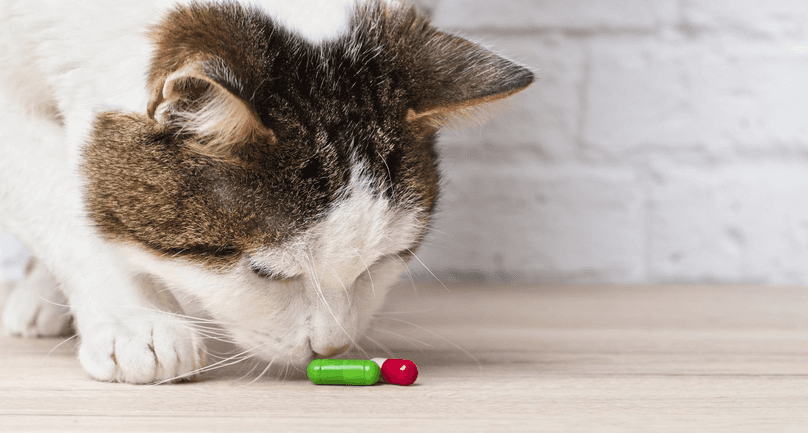
Each year in the United States, 232,000 household pets are accidentally poisoned. While not all toxic exposures are fatal, this figure highlights a persistent threat to pet health nationwide.
National Pet Poisoning Awareness Month occurs annually in March, making spring a good time to raise awareness of toxic exposures to pets and to offer helpful information to decrease the number of pet poisonings annually. Did you know that many common human foods, medicines, household chemicals, and even houseplants can cause potentially serious toxic reactions in cats? If you didn’t, don’t panic. We’ll review the most common causes of pet poisoning, the physical symptoms of toxic exposure in cats, and the steps to take if you suspect your cat has been poisoned.
Common Types of Poisons
In 2018, the Animal Poison Control Center (APPC) of the American Society for the Prevention of Cruelty to Animals® (ASPCA) completed an exhaustive survey in which they reviewed over 213,000 incoming calls to determine the 10 most commonly reported causes of pet poisoning. Their findings showed:
- Over-the-counter medications (19.6%) ranked first among toxic exposures to pets. Accidental consumption of OTC painkillers such as ibuprofen, acetaminophen and naproxen sodium accounted for the majority of OTC poisoning events. Herbal supplements, antihistamines and cold medicines also figured prominently in the report.
- Human prescription medications (17.5%) were second, perhaps not surprisingly , with ADHD meds, antidepressants and heart medications leading the list.
- Foods and food additives (11.4%) such as raisins, grapes and onions ranked high on the list of toxic food exposures (raisins and grapes contain xylitol, a substance toxic to dogs and cats.
- Chocolate (10.1%) received its own category outside of foods because toxic exposures due to consumption of chocolate are common and awareness is high.
Other common sources of toxic exposures to cats include antifreeze, lawn fertilizers, pesticides and household cleaners. Because the vast majority of toxic exposures are accidental, the ASPCA and the APCC urge all pet owners to store potentially harmful chemicals safely, to keep pets away from toxic foods, and to reseal all medications when not in use.
Signs of Poisoning in Cats
If your cat experiences a poisoning emergency, it’s important to understand the symptoms and signs so you can get your pet the help it needs.
- Digestive system . After a toxic exposure, your cat may exhibit excessive drooling, vomiting or diarrhea.
- Respiratory system. You may find that your cat has trouble breathing or is lethargic with little interest in exercise or play.
- Neurological system. Some poisons attack the nerves, so be watchful for tremors or convulsions.
- Cardiovascular system. Racing heartbeat or arrhythmia may also be signs of acute poisoning. Also, blood in your pet’s stool or vomit may indicate internal bleeding.
- Renal system. If your cat is in kidney failure, it may show increased thirst and/or urination as it attempts to flush the toxins from its system.
Other potential trouble signs include pale gums, red or inflamed skin, appetite loss, hiding or reclusiveness. If you notice any of these symptoms, or if you notice any sudden changes in your cat’s health or behavior, contact your vet immediately.
What to Do if You Believe Your Cat Has Been Poisoned
The best way to address a poisoning emergency is to be ready before trouble strikes. Here are a few handy tips:
- Have the Animal Poison Control Center’s number (888-426-4235) in your phone or posted where you’ll see it.
- Have a complete medical history of your pet handy—the treating veterinary staff will find this essential.
- Track your cat’s symptoms carefully so you can provide accurate and complete information to the treating veterinary staff.
- Act quickly. Follow the advice of the APCC and your veterinarian. Poisoning emergencies are often best resolved by early intervention.
We understand how much you care for your pet and hope you find these poison prevention tips helpful.
Your cat’s health depends largely on the safety of its environment. By taking a few simple steps, you can reduce the likelihood that your pet will need emergency medical intervention.